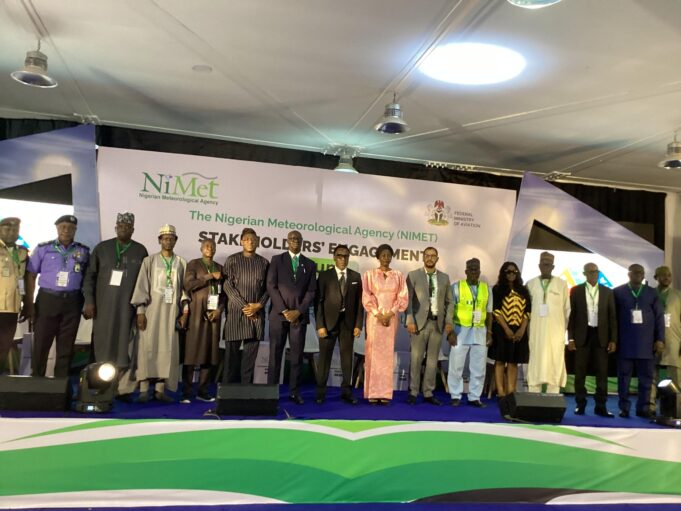By Lateef Fowewe
The Nigerian Meteorological Agency (NiMet) has organised its 2025 stakeholders’ forum where it sought their collaborations to strengthen early warning and action in a bid to enhance climate risk awareness and reduce climate-related disasters.
Speaking at the Stakeholders’ Forum held at Naval Dockyard, Victoria Island, on Wednesday the Director-General, NiMet, Professor Charles Anosike, underscored the agency’s commitment to churning out timely and accurate weather information saying early warnings would only be effective through collaborative action.
The two-day engagement themed “Early Warnings: Raising Awareness on Climate Risks and Promoting Early Action,” marked a historic milestone for NiMet as it seeks to deepen public knowledge and stakeholders’ awareness on impact of weather and climate services.
According to Prof Anosike: “This Forum is aimed at creating a platform for us to share our progress, collaborate, raise awareness, listen to your feedback, co-create solutions and act towards building a climate-resilient Nigeria.”
He also called for continued investment in weather information dissemination services, saying stakeholders must cooperate to ensure effective cost recovery exercise of the Agency.
“Sustaining these services requires continuous investments. In addition to the Federal Government support through budget allocations, the Agency has relied primarily on cost recovery for sustainability and despite the limited resources available to the Agency, service quality has never been compromised, and we are constantly expanding the scope of our services in line with NiMet’s establishment mandate. Hence, a clarion call for support across various sectors to recover more costs and improve on our overall service delivery.”, he said
The NiNet boss recalled, the theme the forum, “Early Warnings: Raising Awareness on Climate Risks and Promoting Early Action,” ‘was carefully chosen to reflect the reality of the time we are living in and highlight the need for us to act’, adding that is no longer news that climate variability and change, leading to frequent extreme weather events, have increasingly threatened lives and livelihoods.
“…and so, early warnings must not end with the forecast alone, they must inspire understanding and drive decisive action. This is why your presence, active participation and engagement in this forum are very critical.”
He noted that NiMet has remained committed to advancing the government’s efforts to mitigate the impact of climate change as well as improve food security, climate-smart sustainable development, and disaster risk reduction, through it’s various products and services, targeted at different sectors.
“These efforts are often capital-intensive, and traditional government subvention alone can no longer sustain the growing demands of weather and climate services. As such, we are aiming to continue the transformation of the Agency’s scientific outputs into impactful services and sustainable revenue streams. We are working with our existing partners, but we also hope to bring in more active partners by the end of this forum.”, he added.
Highlighting NiMet’s pivotal role, he explained that the agency serves all socioeconomic sectors by “observing, collating, processing, and disseminating weather and climate information for the safety of lives and property as well as sustainable development.”
Anosike noted with the essential weather data supporting flight safety and operational efficiency, NiMet has gone digital with tools like the Electronic Flight Folder, offering virtual flight briefings.
He disclosed that the agency has also achieved ISO certification for five airports, including Lagos and Abuja, aiming to expand the list.
He further revealed that NiMet has collaborated with national agencies like National Emergency Management Agency (NEMA) and Nigerian Maritime Administration Safety Agency (NIMASA) to mitigate weather-related disasters and support sustainable growth in the marine and blue economy sectors.
On infrastructure and technology, Anosike revealed that transformative upgrades including multi-model forecasting, in-house technology Meteowiz for real-time data transmission, and new meteorological equipment have been provided through partnerships and government support.
In his remark, Vice President Kashim Shettima who was represented by Inna B. Audu, Special Adviser to the President on Humanitarian Affairs and Development Partners, emphasised the critical role of early warning system, calling for a coordinated and proactive approach to managing climate risks, while urging stakeholders to integrate accurate, timely weather information from the NiMet into all sectors.
“The growing frequency and intensity of weather and climate hazards pose a significant threat to our national development goals, livelihoods, and the well-being of our communities. Early warning systems are not merely technical tools, they are life-saving mechanisms. However, for early warnings to lead to early action, the messages must be accessible, understandable, and usable by decision-makers at all levels.
“By integrating NiMet’s products and services into our sectoral plans, we not only enhance preparedness but also support sustainable development.”, he said.
The Managing Director of Nigerian Airspace Management Agency (NAMA), Farouk Umar, represented by Tayo John, while speaking underscored the urgent need for climate action.
Speaking on behalf of Umar, John said, the forum “could not have come at a better time” given the grave impacts of global warming like rising sea levels, extreme weather, and health risks.
He detailed the aviation sector’s vulnerabilities, including “increased turbulence,” “flight delays and cancellations,” and “airport infrastructure damage” from climate change.
Urging collaboration, Umar called for “workable solutions” to climate challenges and stressed the responsibility of professionals to prevent “disasters on the ground or in the air.”









